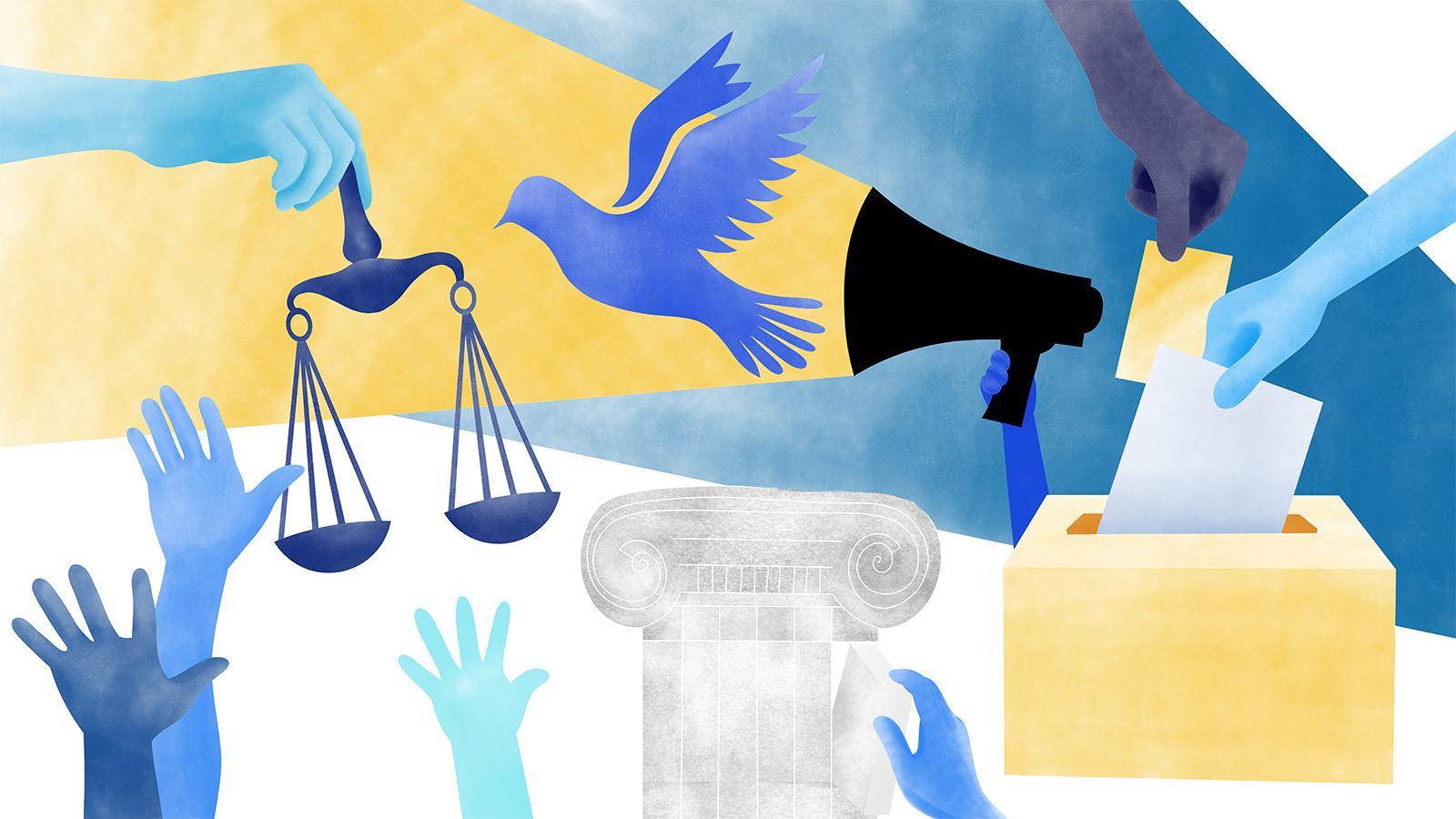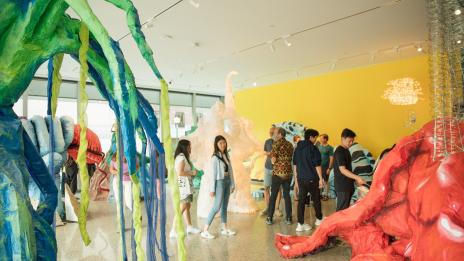By Madeline Swanson | Art by Adam Beeman | Photos by Marc-Grégor Campredon and Kaley Joy
Each day, the campuses of the University of Michigan are bustling with people from all corners of the globe who bring diverse perspectives, values, and knowledge to the community. These unique sets of ideals reflect what we perceive in our community and our country today, and have a profound impact on our democracy. And at a time of political polarization and evolving democratic challenges, an informed, civil, and engaged citizenry is of paramount importance to the preservation of democratic values.
As an institution with an established legacy of informing public policy, championing civil discourse, and commitment to community service, U‑M is leveraging cross-campus partnerships, interdisciplinary research and curricula, and deep student involvement to prepare the community and future leaders to preserve democracy in the United States and nourish it around the world.
Laying the foundation
To fully participate in a democracy, citizens must be informed and engaged. At this divisive moment in our history when extreme ideas are finding audiences, it’s important that individuals are prepared to navigate the constantly changing information landscape and discern the accuracy of data and news coverage; engage in respectful, productive dialogue; and embrace the opportunity to learn from people’s differences.
That’s where U‑M comes in. From UMICH Votes and community partnerships to the Wallace House Center for Journalists to programs and initiatives at the Gerald R. Ford School of Public Policy and opportunities to engage with the arts, leaders at the university are working to ensure every Michigan student graduates equipped to engage with the world as well-rounded citizens.
“We’re helping members of our local community, students, faculty, staff, and all of the communities that we reach understand the value of democracy,” said Celeste Watkins-Hayes, the Joan and Sanford Weill Dean of Public Policy at the Ford School. “It’s about making sure that we participate in the political process and engage civically—whether it's through voting, sitting on juries, running for office, or making sure that we're informed as citizens.”
“It's really important to remember that democracy is an idea that got invented,” said Christina Olsen, director of the University of Michigan Museum of Art (UMMA). “It is an idea and an ideal—it isn't born in the natural world. We came up with it. And so for it to exist, it has to be believed in.”
Creating buy-in communitywide
Beginning with the fall 2024 semester, U‑M President Santa Ono launched the Year of Democracy, Civic Empowerment, and Global Engagement—a universitywide theme year dedicated to programming, academic experiences, and community initiatives meant to inspire and inform.
“There are so many opportunities for people to come together around civic education, voter engagement, and improving the information environment as we pursue our collective future,” Watkins-Hayes said.
Jenna Bednar, faculty director of UMICH Votes and Democratic Engagement, said “our aim is to lift up the expertise that currently exists in our democracy-related research community as well as to build up students’ knowledge and skills, who as Michigan alumni will become the next generation of democracy leaders.”
At the Ford School, a new effort called the Resilient Democracies initiative brings additional resources and urgency to the school’s core work of preparing future leaders for public service through classroom discussion, an ongoing speaker series focused on bipartisan conversations, and faculty training to facilitate constructive dialogue across differences.
“It's about using policy analysis, the tools of communication, and the tools of leadership to influence the public good,” Watkins-Hayes said. “That is Ford’s mission. And that's not going to change.”
As former president Gerald Ford (AB ’35, LLDHon ’74) once said, “the right to vote is at the very foundation of our American system, and nothing must interfere with this very precious right.”
Across U‑M, faculty and staff are thinking outside the box when it comes to making voting accessible to students.
A nonpartisan coalition across all three campuses, UMICH Votes focuses on getting students to the polls by helping them navigate the voting process and understand why their participation matters. The coalition includes a student organization called Turn Up Turnout; Creative Campus Voting Project (CCVP), based in the Penny W. Stamps School of Art & Design; and partnerships with UMMA, the Ginsberg Center for Community Service and Learning, and the Ann Arbor City Clerk’s Office.
Through engagement with the arts, students are gaining a better grasp of their democratic roles and responsibilities.
Take CCVP, for instance. A partnership between the Stamps School and UMMA, CCVP offers students a creative toolbox to manage the challenges student voters face. Through a combination of art and design and creative play, it aims to demystify ballots and the voting process, while ultimately encouraging and increasing voter participation.
“UMMA, in our work with Stamps, is creating a site and space in which your voting career begins. And it’s welcoming, beautiful, inspiring, and easily digestible,” Olsen said. “The arts are how we remember that we're part of a community. They give us the places to exercise that activity as a community. They let us experience a breadth of very different ways of being or acting or thinking in the world in a very concrete, yet emotional way.”
Reestablishing trust
As students and members of the community absorb endless streams of information in their quest to be knowledgeable citizens, having the skills necessary to discern fact from fiction, and detect bias, is crucial. In this era of social media and the 24-hour news cycle, citizens must be able to confidently judge the credibility of their news sources.
Journalists play a key role in ensuring the public is accurately informed. But when trust in the press and other public institutions erodes, civic engagement can wither.
At U‑M, the Wallace House Center for Journalists is helping reestablish this trust.
Founded in 1973, Wallace House offers programs that recognize, sustain, and elevate the careers of journalists to address the challenges of journalism today, foster civic engagement, and uphold the role of a free press in a democratic society.
Lynette Clemetson, the Charles R. Eisendrath Director of Wallace House, points out that democracy is existentially tied to a free press.
“The function of the press is the only profession mentioned in the First Amendment,” she said. “And it's mentioned because our founders realized that for all of the other functions of democracy to work, there has to be a free flow of trusted information, and you have to have a free, independent working press.”
Through their Knight-Wallace Fellowships, accomplished journalists come to U‑M to study, pursue independent projects, sharpen professional skills, and widen their perspectives.
“We are trying to help people understand why journalists do what they do; how we approach our stories; what is ethical, functional journalism and what is not; and the role it plays in society,” Clemetson said. “And Wallace House also acts as an important safe haven for journalists around the world who find themselves under threat.”
Partnering to preserve democracy
For all of this work to be possible, support from donors is critical.
Olsen and Watkins-Hayes consider these supporters as partners in seeking solutions to the challenges our democracy faces.
“We're all witnessing the world and what's happening in it. We all are trying to find ways to make a difference. So we are sort of trying to lock arms and do that,” Olsen said. “The University of Michigan is such a fertile, collaborative place for working on projects and problems together across schools and across disciplines.”
Watkins-Hayes agrees. “We’ve heard so much from our donors and friends that they, too, are concerned about how we can strengthen democracy and how we can ensure that the next generation is ready to take the baton,” she said.
Clemetson said when it comes to solving some of the world’s greatest problems, it’s about expanding impact.
“Philanthropic support is a way of extending the reach of the work that we're doing,” Clemetson said. “And while it’s not an endorsement of any specific viewpoint expressed, it's an endorsement of the idea that the basic principles of an informed and engaged society matter.”











